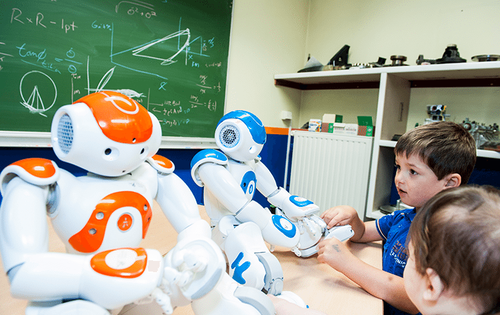 Robots need to be developed to live with human. Source: Vrije Universiteit Brussel. Robots need to be developed to live with human. Source: Vrije Universiteit Brussel. |
VOV Reporter: Welcome to the show. Could you please introduce a bit more about yourself?
Long Hoang: Hello my name is Cao Hoang Long, researcher at Vrije Universiteit Brussel (Belgium) and Can Tho University (Vietnam). In my research group, we focus on human-centered robotics. My research is about developing social robots for many applications. For example, we put robots alongside with therapists in clinics and hospitals, or with salespeople in a retail shops. Having the robots there will not only help the patients and customers but also the therapists and salespeople to reduce workloads.
An Jacobs: My name is An Jacobs. I work at the Vrije Universiteit Brussel in Brussels, Belgium. And I'm working within the department of communication science. I'm an associate professor teaching within communication science and sociology. A part of my team is actually working on human robot interaction. Uh, so what can robots do today for people? Uh, how do they experience them? How that can they work with them? And also how do they imagine for the future, uh, what they would like robots to do and be in their lives.
VOV Reporter: Thank you, An and Long, for joining us today. First of all, could you brief us about the current situation of using robots across countries?
Long: In the world, robots have been used in many applications especially industrial robots. The numbers of robots per worker or robot density are high in developed countries such as Germany, Sweden, Denmark, Belgium, Singapore, Korea. These numbers are much lower in developing countries because the size of industry is small, and the labor cost is cheap.
VOV Reporter: So what about Vietnam?
Long Hoang: In Vietnam, this number used to be low, but it is increasing. We are adopting more and more robots especially for electronics and textile industry. According to the international federation of robotics, in 2017, Vietnam was the 7th biggest robot market in the world.
VOV Reporter: Wow, quite impressive. You’re listening to VOV247’s Lunch Show where we’re talking with Professor An Jacobs and Senior researcher Long Hoang of VUB about Robotics and AI and their impacts on human society including Vietnam. So people usually say robots and AI are going to take all jobs. What is your view?
An Jacobs: I think jobs in general, all jobs actually will be different in future and in the near future already. And that's actually something that's always happened in history. So in that way, it's not very different with other technological innovations. But of course, there are different types of tasks that will be replaced by automation, by robotics, by algorithms.
And that will have impacts on every job. So it's not like all jobs will disappear. All jobs will be transformed. Some jobs will disappear for sure, because they can be automated where they couldn't be in the past. But there will also and that's also something that's not new. There will be new jobs because of the technology. There will be other jobs that will arise because people will need help in setting up the technology, will need help in maintaining it and in controlling it. All kind of new jobs will appear as well.
I'm not so overly pessimistic, but there will be jobs that disappear. And that will be mainly in the middle[-paid] jobs. So not the jobs that needs very specific and localized labor. And also not the jobs [....] that need a lot of cognitive, creative, social and empathic work. Because we will not be able to automate that soon. But in the middle kind of jobs. there are a lot of people that will be in need of learning new skills and looking for new jobs actually.
VOV Reporter: Is there any way to work alongside with robots? And what is your opinion? What are future perspectives about this?
An: Jacobs I think we need to make robots that can work alongside us. Actually, that's also where the innovation today is making robots, sensitive enough for knowing that we are near so they don't in dangerous by hitting us, for example, accidents. And but they also need to be more flexible in the way that we can operate them. Because today they are still not autonomous enough to be very helpful to work next to us. They're still slow. And there are still a lot of things to program before you can have a robots do something for you. So I think that's the way we need to go: to focus actually in the research on how can we create robots that are indeed able to help us next to each other.
Long Hoang: It is one of our research directions. We are working on developing robots to assist human. Some heavy tasks should be replaced by robots. In this case, human workers need to learn to give command to robots. So, the workers do not need to do physical work and the heavy work but supervise the robot operation.
We need to design the robotic system in an interdisciplinary way. Normally engineers just sit in an isolated room designing robots. We need to change it. Our approach is that at the beginning, all stakeholders such as workers, managers, engineers and even lawyers need to sit together to draw requirements of the robotic system. We collect opinions from all perspectives so that the finished system is beneficial for all parties.
VOV reporter: So what are your suggestions for Vietnamese engineering students in this subject?
Long Hoang: For the education system in Vietnam, I suggest students especially engineering students to proactively develop their skills to work in an interdisciplinary environment. So we don’t just focus on the engineering courses but also develop some soft skills like communication. These skills will be very useful when you need to develop a robot system together with teachers, doctors, lawyers in the future. Even if you won’t end up in this industry, I believe that these skills are always useful in other jobs.
VOV Reporter: Thank you for your advice, Long. You’re listening to Professor An Jacobs and Long Hoang of Free University of Brussels on VOV247’s Lunch Show. We’re talking about Robotics and AI and their impacts on human society including Vietnam.
It seems that robots and AI still sound unfamiliar to many people in Vietnam. How can we do to make people have a better understanding about robots and AI?
Long Hoang: We know that robotics and artificial intelligence can help our society in many aspects. But they also raise fears. Some fears I admit that they are reasonable but the other are not. One of the causes of unreasonable fears is that people do not totally understand the new technology. The best way to get some basic knowledge is to try it out. You don’t need to be an expert or an engineer to learn these basic knowledge. I have seen that our young Vietnamese students are very active in many machine Learning forum, robotics forums and communities. For example: Basic machine learning forums, robotics forums. There are also some clubs at laboratories where people at different ages can develop their own robots. For example: the Maker Innovation Space in Can Tho university, funded by USAid, some STEM clubs in Hanoi and Ho Chi Minh City and even in the rural areas of Vietnam.
An Jacobs: I think we need to bring what robots can actually do today more to the people. And that can be in several ways. One way that we tried out actually is writing about the current state of what robots can do and what they may be and will be doing from different perspectives [and] from different disciplines so that people can understand how these robots can actually have impact in every facet of their life. And so that's why we wrote at our university with more than fifty colleagues from all over the university a book answering 30 questions on really different issues like building, fiscally, labor as we discussed earlier; but also like social robotics, defense. Many, many topics to show what kind of issues do we need to discuss while we are further developing this kind of solutions. Because we have improved. We improved a lot during the past decades in what robotics and AI can do. But there are still a lot of developments necessary to make it actually reality in every space that we talk about in these chapters. And so it's really important that people can read about it in an easy way with nice pictures to see actually what we have already, what people are developing and where we probably will go.
VOV Reporter: Can you share with us what you know about the current situation in Vietnam in terms of robots, AI, and Industry 4.0?
Long Hoang: Vietnam currently has a lot of new policies about robots, AI and Industry 4.0. In Vietnam we have a lot of low-skilled jobs, and of course low paid. We also have lots of middle paid jobs with repetitive tasks. These jobs will be influenced by robots and AI. Also for the engineers, they are educated to design systems, but we did not include a lot of social values in engineering education. We want to change it . We want to bring the approach of working and living together with robots and AI to more and more people. We are trying to translate the book Homo Roboticus into Vietnamese. We hope that people from different ages, classes and disciplines, through this book, can have a better understand and a better view about robots and AI, how their lives will be influenced and how they can adapt to this situation.
VOV Reporter: So, in the end, should we fear robots?
Long Hoang: I would like to cite Darwin. It’s not the strongest animal that survives, but the one that is best fit for its environment. Robots and AI are beneficial, and we need to use these technologies wisely. It means we will have to continue adapting to the emerging trend of robotization. Don't underestimate our ability. Human has a long history of evolution. Both cognitively and physically, the human body, through evolution, is much more impressive and complex than the robot machine. We, human, homo sapiens, should help robots and AI work and live together with us for a better world.
VOV Reporter: Thank you so much Professor An Jacobs and Long Hoang for joining us today and sharing interesting information about Robotics and AI. We’re looking forward to reading VUB book Homo Roboticus soon in Vietnamese.
 |
| VUB's Book Homo Roboticus |
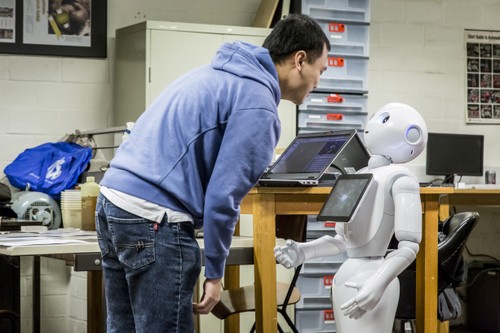 |
| Long Hoang during his social human-robot interaction research. Source: EP |
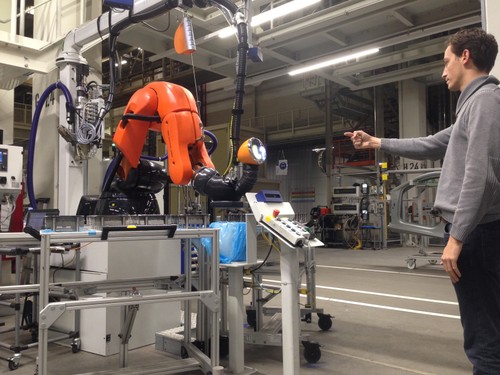 |
|
A robot working together with a worker using gesture commands. Photo courtesy: Flanderstoday
|
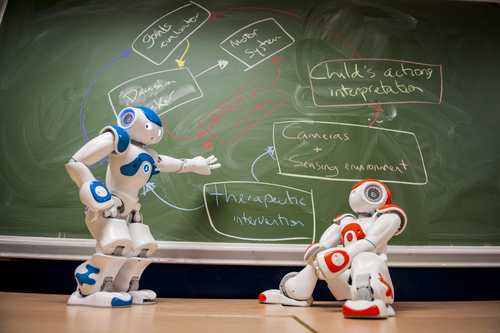 |
| Robots are embedded with social values. Source: VUB |
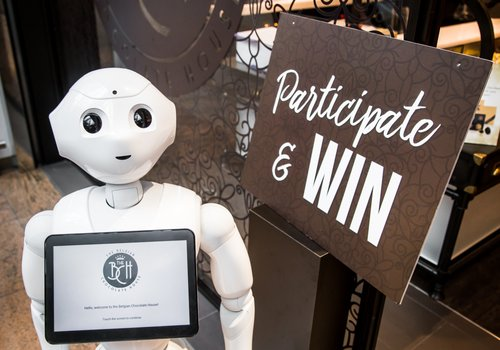 |
| Robot and salesperson working together in a chocolate shop. Source: VUB |
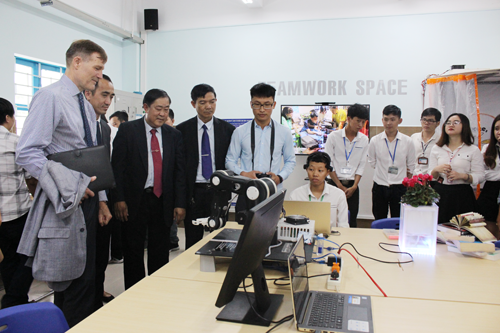 |
| The Maker Innovation Space in Can Tho University. Source: Can Tho University |
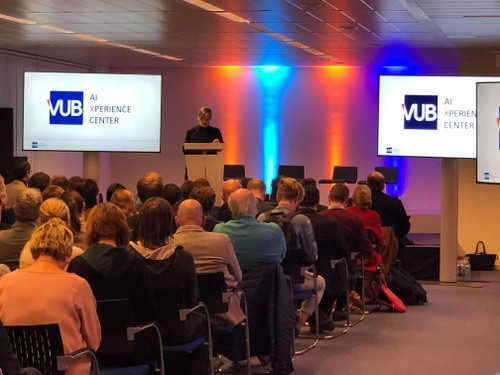 |
| Professor Caroline Pawels - Rector of VUB at VUB AI Experience Center Opening Event on November 21, 2019, in Brussels. |
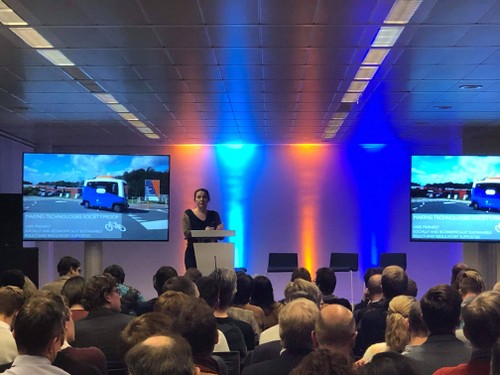 |
| Professor An Jacobs of VUB at the VUB AI Experience Center Opening Event on November 21, 2019, in Brussels. |